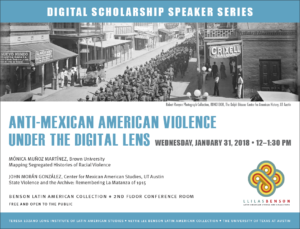
Anti-Mexican American Violence Under the Digital Lens
Wednesday, January 31, `12-1:30 pm
The LLILAS Benson Digital Scholarship Speaker Series presents two scholars who work with digital archives on the topic of anti–Mexican American violence. The event is co-sponsored by the Center for Mexican American Studies.
Mónica Muñoz Martínez is a 2017–19 Carnegie Fellow and the Stanley Bernstein Assistant Professor of American Studies and Ethnic Studies at Brown University.
John Morán González is director of the Center for Mexican American Studies and professor of English at The University of Texas at Austin.
In “Mapping Segregated Histories of Racial Violence,” Mónica Muñoz Martínez uses digital tools to recover and make visible lost and obscured histories of racial violence in Texas from 1900 to 1920. Addressing the fact that local residents in the United States too often have borne the burden of demanding a public reckoning with legacies of state violence and navigating tensions in public memory, she believes new methods of storytelling are needed to help make research publicly available. Working at the intersection of American studies, ethnic studies, public humanities, and digital humanities, she says, has created opportunities to rethink archival research and historical narrative. Explore Dr. Martinez’s digital scholarship at https://mappingviolence.com/.
John Morán González presents “State Violence and the Archive: Remembering La Matanza of 1915,” examining the cultural representations of state violence along the U.S.–Mexico borderlands between 1910 and 1920. Atrocities committed by state authorities in the South Texas borderlands during this period included the summary execution of an estimated 1,000 Mexican-descent residents suspected of aiding a guerilla uprising against the U.S. government, yet historical accounts of anti-Mexican atrocities obscure their white-supremacist origins. Drawing upon the work done by the Refusing to Forget Project, Morán González argues that these representations both enable and limit the possibilities of mobilizing the archive in the service of reforming public consciousness about such events, even as they resonate profoundly with contemporary issues of state violence against people of color, particularly police brutality. VISIT “Refusing to Forget”: https://www.refusingtoforget.org/